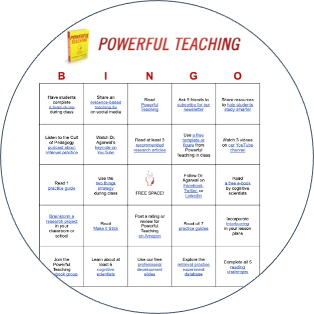Make bite-sized adjustments to what you’re already doing
/My colleague and friend (who’s also a cognitive scientist and educator), Dr. Michelle Rivers, has some simple, bite-sized strategies to use what you’re already doing in the classroom and boost student learning even more.
Dr. Rivers’s strategies take little or no prep, no extra grading, and very little time to implement. Keep reading to find out how to:
Turn your learning objectives into “questions du jour”
Replace name tags with name tents
Invite students to rate their confidence before, during, and after retrieval practice
Encourage students to explain their answers
Plus, listen to a Cult of Pedagogy podcast episode with Dr. Rivers (and figure skating!), which also features Dr. Janell Blunt and her tips on how to use whiteboards for retrieval practice.
P.S. We held a Zoom Party this week. Did you miss it? Subscribe for my newsletter for new announcements and upcoming events.
Small changes make a big difference
As Dr. Michelle Rivers explains in our new book, Smart Teaching Stronger Learning, you can small but powerful adjustments that increase engagement, deepen understanding, and foster sustainable improvements without a complete overhaul of your teaching. Here are a few strategies from Dr. Rivers’s chapter:
Have students answer “questions du jour” before a lesson (questions of the day). Instead of giving them learning objectives, present learning objectives as questions to encourage retrieval practice and activate prior knowledge. Recent research by Dr. Shana Carpenter on “pretrieval” (get it?) and Dr. Faria Sana on learning objectives demonstrate that pre-questions improve learning.
Use name tents (folded cardstock) with a retrieval practice question on the inside. Instead of using name tags to learn students’ names and to help take attendance, use name tents as a brief exit ticket to check for understanding, gather feedback, and encourage reflection. Sample name tent questions include: “What is one thing you learned today?,” “What was the most challenging part of today’s lesson?,” and “How would you use what you learned today outside of class?” (click here to view and download a template for name tents)
Have students rate their confidence before, during, and after retrieval practice to improve their metacognition. For example, you could say, “How confident are you that your response is correct? Hold up one finger if you’re not confident (just guessing) and five fingers if you’re very confident.” This quick self-assessment allows students to recognize when they may need more practice or review.
Invite (or require) students to explain their answers to questions. Instead of just assessing learning with multiple-choice questions, use self-explanations to help students think more deeply and connect what they’re learning to other concepts. Also, when students are torn between two answers, explaining their choice can often help them make a decision. For more information about this strategy, read this blog post about elaboration by Dr. Megan Sumeracki and this blog post about self-explanations with multiple-choice questions by Dr. Cynthia Nebel and the Learning Scientists.
Learn about Dr. Michelle Rivers
Dr. Michelle Rivers (she/they) is an Assistant Professor at Santa Clara University near San Jose, California. They teach courses on cognitive psychology and research methods. Dr. Rivers has also taught hands-on science and engineering topics to K–12 students, tutored high school students, and taught undergraduate and graduate courses focused on research methods and cognitive science.
Dr. Rivers’ research applies theories of learning and memory to enhance educational practice. They are particularly interested in investigating factors that contribute to students’ metacognitive judgments. Their work has been published in leading peer-reviewed academic journals, and recognized by the National Science Foundation, the American Psychological Association, and the Psychonomic Society.
Dr. Rivers is passionate about science communication and mentoring LGBTQ+ students interested in STEM fields. They founded the blog Cogbites (bite-sized cognition, cogbites.org), where early-career scientists work together to translate research about the study of mental processes for the general public. Dr. Rivers earned their Ph.D. from Kent State University.
Dr. Rivers’s recent publications (with links to PDFs):
Rivers, M. L., Babineau, A. L., Neely, K. P. & Tauber, S. K. (2025). How do students and faculty consider numerical ratings and comments about daily quizzing when interpreting student evaluations of teaching? Teaching of Psychology, 52(1), 86-97.
Clark, S. A., Rivers, M. L., & Overono, A. L. (2025). The role of answer justification in multiple-choice testing: Effects on performance and metacognitive accuracy. Behavioral Sciences, 15(4), 477.
Rivers, M. L. (2023). Test experience, direct instruction, and their combination promote accurate beliefs about the testing effect. Journal of Intelligence, 11(7), 147.
Rivers, M. L. (2021). Metacognition about practice testing: A review of learners’ beliefs, monitoring, and control of test-enhanced learning. Educational Psychology Review, 33, 823-862.
Rivers, M. L., Dunlosky, J., & Persky, A. M. (2020). Measuring metacognitive knowledge, monitoring, and control in the pharmacy classroom and experiential settings. American Journal of Pharmaceutical Education, 85(4), 549–560.































